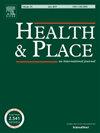恐水症、失联与差异:了解中国移民对新西兰奥特亚罗瓦海岸游泳的恐惧。
IF 3.8
2区 医学
Q1 PUBLIC, ENVIRONMENTAL & OCCUPATIONAL HEALTH
引用次数: 0
摘要
新西兰的沿海蓝色空间,从港口到海滩,提供了各种福利,但也可能是危险、恐惧和文化争议的场所。这项定性研究的重点是奥克兰的中国移民,他们在沿海娱乐活动中所占比例较低,而在溺水统计中所占比例较高。研究结果表明,中国移民与沿海蓝色空间缺乏联系,害怕在沿海游泳,这源于他们的家乡习惯和沿海 "蓝色空间 "文化资本的缺乏。我们的研究有助于提高对 "恐水症 "的认识,以及休闲空间的种族化如何影响蓝色空间和实践的治疗潜力。本文章由计算机程序翻译,如有差异,请以英文原文为准。
Hydrophobia, dis/connection, and difference: Understanding Chinese immigrants’ fear of coastal swimming in Aotearoa New Zealand
New Zealand's coastal blue spaces, from harbours to beaches, provide diverse wellbeing benefits but can also be sites of danger, fear, and cultural contestation. This qualitative research focuses on Chinese migrants in Auckland, a community who are underrepresented in coastal recreation and overrepresented in drowning statistics. Findings show Chinese migrants dis/connection with coastal blue space and fear of coastal swimming, derived from their homeland habitus and lack of coastal ‘blue space’ cultural capital. Our research contributes to the growing recognition of ‘hydrophobia’, and how the racialisation of leisure space impacts the potential for blue spaces and practices to be therapeutic.
求助全文
通过发布文献求助,成功后即可免费获取论文全文。
去求助
来源期刊

Health & Place
PUBLIC, ENVIRONMENTAL & OCCUPATIONAL HEALTH-
CiteScore
7.70
自引率
6.20%
发文量
176
审稿时长
29 days
期刊介绍:
he journal is an interdisciplinary journal dedicated to the study of all aspects of health and health care in which place or location matters.
 求助内容:
求助内容: 应助结果提醒方式:
应助结果提醒方式:


